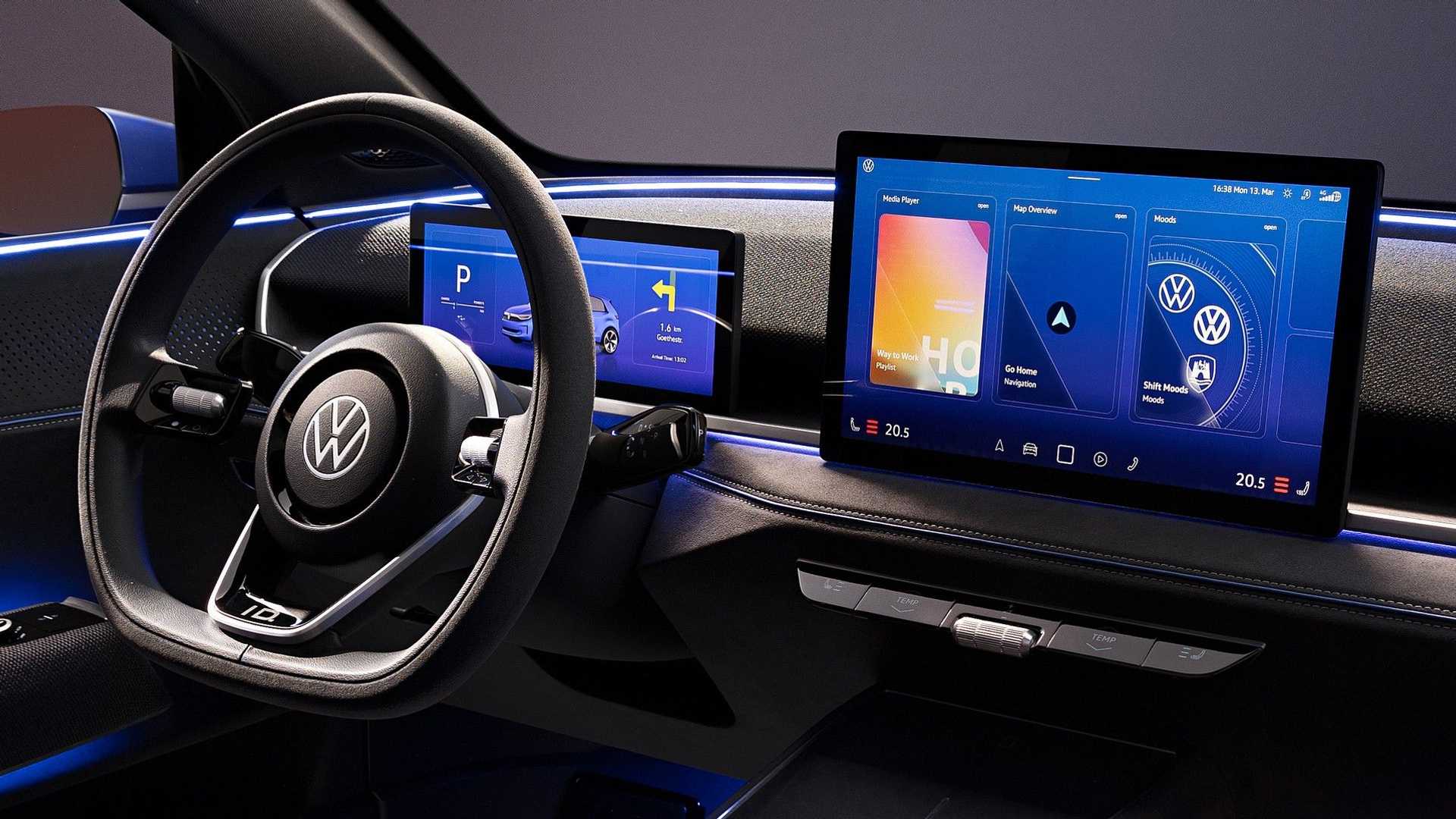Volkswagen Will Bring Back Physical Buttons In New Cars | Down with touch screen controls.::Volkswagen says that it has heard the feedback from its customers. It plans to bring back physical buttons and controls in future models.
There’s so many fewer points of failure when you use physical buttons as opposed to touch screens. I hope everyone follows suit.
The physical buttons aren’t attached to anything though. It’s still software. My ford buttons glitch out when the soft buttons and steering wheel buttons do.
It’s because they cheaped out and used (cheap) electromechanical switches for the buttons and electromechanical rotary encoders for the knobs.
If they used magnetic hall effect switches they’d never glitch (unless the microcontroller itself is glitching). Hall effect switches are forever.
(And no: Even cars in Arizona don’t get hot enough to wreck rare earth magnets… They’ll lose strength slightly above 80°C but not enough to matter since the car knows its internal temp and can compensate if they didn’t get the better sensors that auto-compensate).
For reference, hall effect switches and encoders aren’t really that much more expensive for something like a car where you’re going to be using/making millions of them. It probably saves pennies per car to use the cheap switches.
It’s because the knobs control software and the software is buggy. The volume knob is not connected to the amp for instance.
The knob or switch longevity isn’t even in question yet.
If the volume knob was connected to the amp you’d hear the static from a shitty potentiometer that’s wearing out. Instead what you get is a volume knob that occasionally skips steps because it’s an electromechanical rotary encoder and doesn’t rely on brushes rubbing against a gradient resistive wheel (that literally wears itself away over time which is why car manufacturers switched to rotary encoders in the first place).
The software sucks too (absolutely!) but it’s pretty obvious when the problem is one of the following:
- Skipped control (e.g. volume) steps. Indicates that a contact has worn out (oxidized too much).
- The car suddenly thinks a knob is being turned constantly in one direction (e.g. volume suddenly goes up up up or down down down sometimes forever until you move the knob). This can be “bouncing” or just a contact that’s getting stuck (because dust/car gunk got in there).
These two things are clear indicators of electromechanical components failing. Not normally caused by buggy software.
Neither of these things happen when you use hall effect switches or hall effect rotary encoders (for knobs).
What I don’t get is this constant cheating where they don’t have to.
Even where making a real thing with its advantages is cheaper or same, they’ll still make it dependent on something that breaks.
Well, it would be advantageous where no competition will do the real thing. But we have competition, right? Free markets, right? No cronyism, right? LOL
Physical buttons have wiring harness failure, mechanical failure, and software failure…pretty much exactly the same amount as the touchscreen solution.
What boggles my mind is that cheap, snappy, easy-to-use touchscreen interfaces have been a solved issue for well over a decade with the proliferation of smartphones…why the hell do car manufacturers suck so much at implementing it!? They’re all slow bug-ridden shitshows.
They probably don’t want to use the necessary processor to do it because it costs more so you end up with laggy interfaces instead.
I can’t imagine that they’re using a powerful enough processor, and their code is just so bad that its slow.
It’s clearly doable, Tesla has a snappy smooth interface. It still struggles a bit on pre ryzen cars with the web browser or video players like Netflix, but the actual car interface for car things runs fine and has for a very long time now.
It’s because car manufacturers are loath to change microcontrollers in their vehicles because they’ve got decades of processes, tooling, and debugging with the (Atmel) chips they’ve been using since forever. When they decide to make a new car they basically just look at the latest Atmega(whatever) “automotive” chip (using really old chip tech) and choose that.
Atmel has “automotive” chips for everything! From regular MCUs to beefy ones with boatloads of pins and (slow ass) LCD controllers. They’ve made it so that car manufacturers don’t even have to think! The engineers probably get an automatic OK to use whatever Atmel “automotive” chip they want but anything else requires a lengthy and expensive certification process.
Some cars are using STM32 chips made for automotive but they’re not as common as you’d think!
Basically, the car manufacturers are extremely risk-averse because of low margins and something like an ECU recall can totally ruin the profitability of a new car. They’re also lazy and don’t want to try new things! There, I said it 😁
He’s talking points of failure when it comes to a person interacting with it. At least that’s my take. Imagine you’re reaching for a volume button instead of a volume slider on the screen. You’re going to hit that mofo basically every single time. Whereas with the touch screen you’ve got to look and pay attention. Make sure your finger goes in exactly the same place etc etc.
It’s a combination of, car manufacturers want to put cheap parts in where possible to maximize profit, and these snappy tablets you refer to aren’t snappy for a decade or even live a decade. Car screens need to make it the life of the car, which is expected to be roughly 10 years with most brands, if it sucks the same year 1 as it does year 10 that’s a success. The car manufacturers are valuing reliability over performance
If you don’t bloat the software it will run the same year 10 as in year 1. The reason electronics get slow, is because developers tend to get lazy when compute resources are abundant.
How do you do “mechanical failure” with hercons? I’m all attention. They may not be as pleasant to use, but beat touchscreens still.
I’m fine with some touch controls, but volume, temperature, and gear shifter should never be touch only. All 3 are frequent operations in a vehicle and require too much visual focus when you’re trying to drive. It’s unsafe to take your eyes off the road for this to check the precision of your change. The advantage of physical buttons is that you can adjust them without looking. Also, for volume especially, you frequently want to go from zero/very low volume to higher volume and vice versa. A lot of touch controls are tap-based. Changing volume by tapping is tedious. Tap and hold is worse because you’ll likely overshoot your mark and stress out yourself and your passengers by blasting the volume. Temperature has similar issues, but not as bad because the range of adjustments required aren’t as drastic. Nonetheless, I change the temp often enough, that I don’t want to look.
And, don’t get me started on going between drive and reverse with a touch screen while trying to execute a 3-point turn. People with Teslas always try to defend this with me and, I’m sorry, but no. Changing drive modes should require a physical shifter by law, for safety.
Ok but hear me out… We could save a couple of bucks putting all pedals in the touch screen as well. All those mechanical parts are costly. And now that I think of it, the steering, my god, the steering! Your wallet will thank us for the extra profit we’ll make from cost cutting.
Volume is already handled from the steering wheel in all modern cars? Can you even get cars anymore without steering wheel controls for basic things like volume/mute, calls etc.?
As for gear shifter, that’s not important, you’re not changing gears while moving unless you’re driving a manual, in which case it’s still a mechanical lever anyways.
Yeah, I dislike the volume controls on steering wheels. Admittedly, those are mostly buttons, but what you really need is a knob. No one wants to press a button 30 times to raise or lower the volume.
And, I’d encourage you to read the last bit of my comment about changing drive modes while doing a 3-point turn around strongest reasons for a physical shifter.
I have steering wheel volume buttons and they are more of a pain then reaching for the know to turn it.
Don’t Teslas have physical gear shifters?
Oh, TIL the Model S doesn’t. The only Tesla I’ve been in is a Model Y and that one does have a physical one.
I wish there was a subreddit/community for when tech reverts back to sanity (like all digital/screeny tablet console cars, local only/encrypted shit, etc)
Be the change you desire
I’m a dilettante/ideas guy, I just broadcoast the poppy seeds ;)
The last thing I want to do is navigate a tablet when I’m operating a vehicle. I don’t know how it ever made sense in the first place.
VW really marketed their way into every feed on every site by making a big deal about… putting buttons in their cars. All hail our corporate overlords, who give us our buttons and dominate our feeds.
They need to make it clear they understood they messed up and are backtracking.
Just not with emmisions, or government supported market manipulation.
Finally, a good decision. I’ve nothing against touchscreens, but not for everything.
Also, generally their software is so bad. I’m using a new Skoda Kodiaq at work and its GPS is a nightmare compared to older cars.
Yeah software in most cars is really underdeveloped and neglected, leaving it in a horrible state. Manufacturers have handled the transition to a digital interface extremely bad.
Fuck the buttons, I want brass-handled pull-ropes.
You are a person of fine taste! Here’s a car for you A full replica of Il Tempo Gigante from the movie Flåklypa Grand Prix
Here is an alternative Piped link(s):
Piped is a privacy-respecting open-source alternative frontend to YouTube.
I’m open-source; check me out at GitHub.
Thank god.
Thats whats held me back from buying an ID. My new truck has all touch screen and I hate it.
I own an ID.4. The capacitive steering wheel buttons were probably my biggest fear when we bought this car.
But, they work great. In a year (with 23,000 miles) I’ve only had a miss-touch a couple times. Swiping to change volume is way better than button pounding.
The capacitive temperature and volume controls under the screen work just fine, too. Now they do need to be illuminated, which they will be in the 2024 model, but it’s great to swipe to the temp or volume you want.
The capacitive buttons on the dash to the left of the steering wheel work the worst. They are for the fog lights and defroster controls. It just doesn’t seem to register where you press, so that takes a couple tries, but they aren’t used often.
I’d honestly be sad to see them go.
Swiping to change volume is way better than button pounding.
It is, but it’s worse than having a physical scroll wheel with nice tactile steps, like even my Fabia has.
The capacitive temperature and volume controls under the screen work just fine, too. Now they do need to be illuminated, which they will be in the 2024 model, but it’s great to swipe to the temp or volume you want.
Again, not as good as a dial that you can feel and don’t need to take your eyes off the road to operate.
Plus the whole driving with gloves issue.
Ford learned this like 8 years ago.
https://www.cars.com/articles/ford-to-add-more-physical-buttons-to-myford-touch-1420663064620/
What’s this a computer-car for ants?
It’s made for adults who can’t drive good and who wanna learn to do other stuff good too.
Ouch heehee ;) Too much bad thinkings while bad drivings
I’m thrilled to hear that Volkswagen is bringing back physical buttons in their new models! Touchscreen controls can be quite frustrating and distracting while driving. It’s great to see a company listening to customer feedback and making changes that enhance the driving experience. For those looking for a reliable place to buy cars, check out Cars45. They have a wide selection of vehicles and offer great services.
Certainly! Here’s a comment in English:
It’s refreshing to see Volkswagen taking customer feedback seriously. Bringing back physical buttons and controls in future models is a smart move towards improving user experience and addressing user preferences. This customer-centric approach shows Volkswagen’s commitment to listening to its market and adapting accordingly. Looking forward to seeing how these changes enhance the driving and usability of their vehicles!












